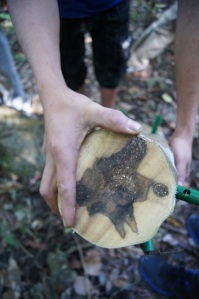Agarwood / Oudchips/ Aloeswood
Agarwood is a resinous heartwood that sometimes occurs in trees belonging to the genus Aquilaria (Thymelaeceae family). Aquilaria is a fast-growing, archaic subtropical forest tree, with a population range stretching from South Asia’s Himalayan foothills, throughout Southeast Asia, and into the rainforests of Papua New Guinea. It grows at elevations from a few meters above sea level to about 1000 meters, with approx. 500 meters being most ideal. Aquilaria can grow on a wide range of soils, including poor sandy soil. Seedlings require a great deal of shade and water but will grow rapidly, producing flowers and seeds as early as four years old. At least fifteen species of Aquilaria are known to produce the much sought-after agarwood.

Cross section of tree showing resinous heartwood
Usage
The “Wood of the Gods” has been traded and highly coveted for thousands of years. The resinous wood is used as incense, for medicinal purposes, and pure resin in distilled form is used as an essential oil as well as a perfume component. Outside its native countries, it is most widely known in the Middle East, China, Taiwan, and Japan. A strong connection exists between use, religion, and curative properties, and elaborate traditional and religious ceremonies are known around the world.
Value
The value of first-grade Agarwood is extremely high. A wide array of products of different grades is available on the market, varying with geographical location and cultural deposition. Prices range from a few dollars per kilo for the lowest quality to over hundreds thousand US dollars for top quality oil and resinous wood.
Why is it so expensive?
One of the main reasons for the relative rarity and high cost of agarwood is the depletion of the wild resource.

